Search our Grants
MDA’s research program awards grants to the world’s best scientists investigating promising theories and therapies that may accelerate treatments and cures for families living with muscular dystrophy, ALS and related neuromuscular diseases.
Grant - Summer 2018 - FSHD – Francis Michael Sverdrup, PhD
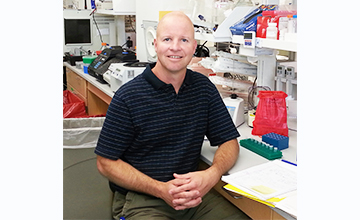
“I was inspired to start drug discovery research in FSHD when my daughter was diagnosed with the disease at the age of 10. Because no treatments are currently available, I have a strong motivation to help the field advance promising drug targets into clinical trials. With clinical trials for FSHD on the horizon, it is very exciting to see the rewards of the hard work by many talented scientists over the last 20 years. It is no longer just about the basic research but moving this knowledge to treatments.”
Francis Michael Sverdrup, associate professor of Biochemistry and Molecular Biology at Saint Louis University in Missouri, was awarded an MDA Research Grant totaling $300,000 over 3 years to study drugs targeting DUX4 expression in facioscapulohumeral muscular dystrophy (FSHD).
DUX4 protein produced in skeletal muscle is considered to be the key cause of muscle degeneration in FSHD. Therefore, suppressing DUX4 expression is a primary therapeutic approach for halting disease progression. Identifying drug candidates for this purpose is a critical step. Such drugs would prevent the many detrimental activities of this toxic protein and potentially provide the first candidate therapies for slowing or stopping disease progression in FSHD.
Dr. Sverdrup and colleagues recently identified 2 classes of drugs that suppress DUX4 using cell-based screens. Additionally, they have identified a class of modulators of intracellular signaling that similarly decrease DUX4 expression in differentiating FSHD muscle cells. Comparison of these 3 drug classes and understanding the mechanisms of DUX4 repression for each is a critical step in advancing the best therapy toward the clinic.
The proposed experiments will show which drugs are best at controlling DUX4 expression in animal muscles and therefore will be best suited for advancing to human clinical trials.
Grantee: FSHD – Francis Michael Sverdrup, PhD
Grant type: Research Grant
Award total:
Institution:
Country:
Grant - Summer 2018 - DMD – Melissa Spencer, PhD

“One of the biggest barriers to success for gene therapies is the ability to deliver the cargo to the tissue of interest. In our case, the goal is to reframe the DMD gene in skeletal muscle and the heart. By developing a systemically injectable nanoparticle delivery platform, we hope to have a mechanism to use to deliver our CRISPR platform to multiple muscles in the body.”
Melissa Spencer, professor of Neurology at the University of California at Los Angeles, was awarded an MDA Research Grant totaling $300,000 over 3 years to work on the development of nanoparticles for the treatment of neuromuscular disorders.
For Duchenne muscular dystrophy (DMD), a primary goal of therapy development is to correct the DMD gene mutation. To that end, researchers are developing therapies such as micro-dystrophin (a smaller version of dystrophin) gene replacement and CRISPR Cas9 gene editing. In each case, they are relying on a small virus called AAV (adeno-associated virus) to deliver these therapies to the muscles and heart within the body.
However, AAV-based delivery of these therapies poses a couple of ongoing challenges. The first challenge with AAV-based delivery is that it is not completely efficient at targeting muscle cells and may target other cells. The second challenge is that AAV is a virus that exists in the environment. This means that some people may have already been exposed to AAV and could reject the AAV when it’s given as a therapy. Also, because of this immune response, AAV can be administered only one time to a person, which could be a problem if re-dosing is necessary.
To address these issues with the AAV-based approach, the Spencer lab is developing nanoparticles as an alternative method for delivering gene-editing and gene-replacement therapies. Nanoparticles are very small (1 nanometer) organic or inorganic molecules that can carry drugs or nucleic acids (DNA or RNA) and can be re-administered multiple times. Additionally, the nanoparticles are transient, so if unwanted side effects or safety concerns occur, nanoparticle administration could be discontinued. Using this approach, the investigators hope to develop a better delivery vehicle for systemically injected gene-replacement and gene-editing therapies to muscle.
Grantee: DMD – Melissa Spencer, PhD
Grant type: Research Grant
Award total:
Institution:
Country:
Grant - Summer 2018 - LGMD – Dorianna Sandona, PhD

“In the last years, researchers understood that to fight orphan diseases the sole possibility is to join forces and share data. I think that people with NMDs must have hope in research. The way to identify an effective therapy is long and full of hurdles. We don’t want to create false hope; however, we are doing our best, and we need patients’ enthusiasm and support.”
Dorianna Sandona, research scientist at the University of Padova in Italy, was awarded an MDA Research Grant totaling $300,000 over 3 years to study novel zebrafish models of sarcoglycanopathy subtypes of limb-girdle muscular dystrophy.
The sarcoglycanopathies are a subtype of LGMD caused by defects in alpha-, beta-, gamma-, and delta-sarcoglycans (SGs). SGs are components of an essential complex for muscle integrity, as they help stabilize the muscle membrane during muscle contractions.
In order to screen for molecules able to restore a functional SG-complex, Dr. Sandona will mimic sarcoglycanopathy in zebrafish and develop an advanced in vitro model based on cells derived from patients. Both models will be utilized to assess efficacy and safety of the small molecules for use as potential therapeutics. Zebrafish are a versatile model organism that allows for simple functional assays to test any potential drug. On the other hand, the model based on patient’s cells allows researchers to evaluate the efficacy of compounds directly on human, pathologic samples. If successful, the work, combining data coming from the different models, may shorten the gap toward therapy testing in this class of LGMD.
https://doi.org/10.55762/pc.gr.81540
Grantee: LGMD – Dorianna Sandona, PhD
Grant type: Research Grant
Award total:
Institution:
Country:
Grant - Summer 2018 - ALS – Jeffrey D. Rothstein, MD, PhD

“Answer ALS is a nationwide consortium that is assembling the largest and most comprehensive ALS dataset to date, in which clinical, behavioral, and extensive cellular datasets will be collected from 1000 patients.”
Jeffrey D. Rothstein, director of the Brain Science Institute and director of the Robert Packard Center for ALS Research at Johns Hopkins University School of Medicine in Baltimore, Maryland, was awarded an MDA grant totaling $550,000 over 3 years for Answer ALS, a tool for data integration and characterization of disease networks.
Amyotrophic lateral sclerosis (ALS) is a progressive disease of the nerve cells that leads to loss of voluntary muscle control, paralysis, difficulty speaking, swallowing, and, ultimately, breathing. Today, scientists recognize that ALS is unlikely to be one disease; rather, it may be a collection of subtypes and variants, each of which requires a different approach for optimal treatment.
Answer ALS is a nationwide consortium that is assembling the largest and most comprehensive ALS dataset to date, in which clinical, behavioral, and extensive cellular datasets will be collected from 1000 patients. This comprehensive dataset will allow, for the first time, in-depth study of the underlying disease mechanisms. Mining this rich, complex dataset with the goal of identifying ALS disease subtypes requires sophisticated computational tools.
The support for this project will facilitate the development of a series of these tools, known as probabilistic graphical models (PGMs), to specifically interrogate and interpret the combined Answer ALS datasets. PGMs have been used extensively in applications from finance to artificial intelligence and health care diagnostics. These flexible, interpretable models are able to identify and quantify changes in cellular pathways. Creation and application of PGMs to enable integrated models of this comprehensive dataset will enhance our understanding of disease mechanisms and advance the discovery of targets for effective therapy.
Grantee: ALS – Jeffrey D. Rothstein, MD, PhD
Grant type:
Award total:
Institution:
Country:
Grant - Summer 2018 - DMD – Dr. Russell Rogers, PhD

“Many cutting-edge approaches to treating DMD are currently under development. Each offers distinct advantages over current standard care. It is without a doubt that the most hope would be placed into therapies that offer the most benefit (both therapeutically and in applicability) and are on the verge of clinical translation.”
Dr. Russell Rogers, postdoctoral research fellow at Cedars-Sinai in Los Angeles, California, was awarded an MDA Development Grant totaling $120,000 over 2 years to study cell-free therapy to treat Duchenne muscular dystrophy (DMD).
In DMD, skeletal and heart muscle are highly fragile and degenerate easily, leading to loss of independence and heart disease. There are currently limited treatment options available to address the disease.
Cardiosphere-derived cells (CDCs) are cardiac progenitor cells that have been tested in preclinical and clinical studies in DMD. These studies suggest CDCs may someday be a safe and effective therapy. CDCs work by secreting nanosized particles that carry genetic information called exosomes (CDC-exos). A single dose of CDC-exos dramatically improved skeletal muscle and heart function in a preclinical animal model of DMD.
Dr. Rogers and colleagues plan to study whether CDC-exos could be beneficial in preventing the disease’s onset or delaying disease progression. The work proposed tests this hypothesis by treating DMD mice models with CDC-exos prior to significant skeletal muscle and heart disease. If the hypothesis is supported, the proposed work would be an important leap toward developing new therapeutic approaches to this refractory, progressive disease.
Grantee: DMD – Dr. Russell Rogers, PhD
Grant type: Development Grant
Award total:
Institution:
Country:
Grant - Summer 2018 - SBMA – Carlo Rinaldi, MD, PhD
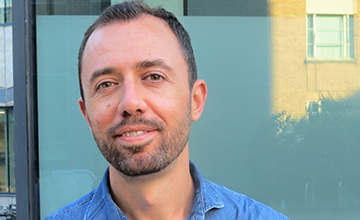
“Better understanding of the underlying disease mechanisms, coupled with improvement of gene vector design, therapeutic gene selection, and methods of delivery, have made gene therapy a realistic option for neuromuscular conditions — and neurological diseases in general — for which no treatment option was available until few years ago. Many challenges still lie ahead, but we have good reasons to be very optimistic for the future.”
Carlo Rinaldi, associate professor and clinician scientist at the University of Oxford in England, was awarded an MDA Development Grant totaling $120,000 over 3 years to study the role of androgen receptor isoforms in SBMA pathogenesis and the potential as therapeutic targets. This grant is co-funded by the American Association of Neuromuscular and Electrodiagnostic Medicine (AANEM).
Mutations in the gene encoding the androgen receptor (AR) protein cause spinal and bulbar muscular atrophy (SBMA). SBMA is an adult-onset neuromuscular condition affecting males with unmet clinical need. It is not undestood how mutations in AR lead to primary degeneration of motor neurons and muscle in patients. The activity of AR and other hormone receptors can be modulated in human cells by isoforms and/or splice variants, which may block or enhance their functions.
Dr. Rinaldi and colleagues plan to investigate the role of AR alternative isoforms in mediating SBMA toxicity. By revealing how these isoforms regulate AR activity in health and disease, researchers expect to better understand the mechanisms of disease in SBMA and provide a novel rational therapeutic target. If successful, the work could pinpoint tissue-specific targets for therapy development, with implications not only for SBMA but for other diseases of the motor unit as well, including spinal muscular atrophy and amyotrophoic lateral sclerosis.
https://doi.org/10.55762/pc.gr.81520
Grantee: SBMA – Carlo Rinaldi, MD, PhD
Grant type: Development Grant
Award total:
Institution:
Country:
Grant - Summer 2018 - ALS – Joel Richter, PhD
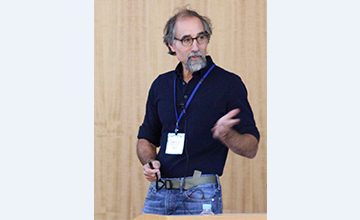
“There are two outcomes we hope for. One outcome is basic understanding of how toxic peptides are generated from C9orf72. The second outcome – which is some distance in the future – will be to use our knowledge to inhibit the product ion of these toxic peptides and thereby mitigate or delay at least this one form of ALS.”
Joel Richter, Arthur F. Koskinas Chair in Neuroscience, and Fen-Biao Gao, Governor Paul Cellucci Chair in Neuroscience Research, both at the University of Massachusetts Medical School in Worcester, were awarded an MDA Research Grant totaling $300,000 over 3 years to study a potential inhibition of translation of G4C2-containing RNA as a novel therapy for C9orf72-ALS.
Amyotrophic lateral sclerosis (ALS) is a fatal disease caused by motor neuron degeneration and resulting muscle wasting. Most causes of ALS are unknown, but the most commonly known genetic cause is an aberrant C9orf72 gene expansion that leads to the toxic accumulation of dipeptide repeat proteins (DPRs).
Previous collaborative work in Drs. Richter and Gao’s labs has identified regions in C9orf72 RNA that could be blocked by binding to complementary DNA antisense oligonucleotides (AS-ODNs). Such AS-ODNs would inhibit DPR production, thereby slowing or inhibiting disease progression.
Drs. Richter and Gao propose to use human disease neurons in culture and C9orf72 model mice to test the efficacy and specificity of AS-ODNs to inhibit DPR synthesis and mitigate ALS pathophysiology. It’s hoped this work will have a major impact on the clinical treatment of ALS.
Grantee: ALS – Joel Richter, PhD
Grant type: Research Grant
Award total:
Institution:
Country:
Grant - Summer 2018 - ALS – Laura P.W. Ranum, PhD
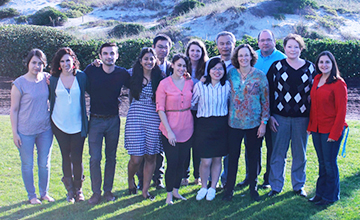
“We are at an exciting time in the field of repeat expansion disorders because as a research community we are starting to understand there are common threads between these diverse disorders. The field is also progressing faster and faster toward clinical trials and a growing appreciation for how therapies for one disorder may lead to similar therapies for another disorder.”
Laura P.W. Ranum, professor of Molecular Genetics and Microbiology and director of the Center for NeuroGenetics at the University of Florida’s College of Medicine in Gainesville, was awarded an MDA Research Grant totaling $300,000 over 3 years to study the contributions of RAN proteins to C9orf72 ALS/FTD.
Expansion of a section of repetitive DNA in the C9orf72 gene is the most common genetic cause of both amyotrophic lateral sclerosis (ALS) and frontotemporal dementia (FTD). This discovery linked C9-ALS/FTD to a larger group of more than 30 different repeat expansion mutations that also cause neurodegenerative diseases. These repeat expansions are also capable of producing novel toxic proteins in the absence of the regular starting sequences. These proteins have been found in human autopsy tissue of patients with C9-ALS/FTD and other repeat-associated diseases.
Understanding how these proteins contribute to C9-ALS/FTD will be important to developing effective treatment strategies. Dr. Ranum and colleagues have generated mice that successfully mimic the disease features of ALS/FTD patients and will use these mice to understand how the body reacts to these novel proteins and if this interaction contributes to disease. The researchers will also determine how certain cellular conditions lead to the production of these novel proteins and if these pathways can be manipulated to reduce the number of proteins produced.
These studies will result in a greater understanding of how the response to these proteins contributes to disease while also determining if scientists can modify this response to help combat this devastating disease.
Grantee: ALS – Laura P.W. Ranum, PhD
Grant type: Research Grant
Award total:
Institution:
Country:
Grant - Summer 2018 - MG – Kevin C. O’Connor, PhD

“Overall, this work will further our understanding of how MG initiates and progresses, and uncover fundamental disease mechanisms that have the potential to change the understanding of the immunopathology. In addition, we expect to develop clinically relevant disease models that will directly impact patient care.”
Kevin C. O’Connor, associate professor of Neurology at Yale University in New Haven, Connecticut, was awarded an MDA Research Grant totaling $300,000 over 3 years to study novel isolation and investigation of pathogenic cells in myasthenia gravis (MG).
Autoimmunity is a malfunction of the immune system where an immune response develops against one’s own tissues (self). MG is an autoimmune disease caused by circulating autoantibodies (antibodies against self), produced by a malfunctioning immune system, that interrupt signaling at the neuromuscular junction. Patients experience muscle weakness, which can be deadly when muscles involved in respiration are affected.
The human immune system is comprised of trillions of cells distributed throughout the body. Only a tiny fraction directly contributes to autoimmune disease. In MG, those that contribute are a subset of B cells, which produce the autoantibodies. In order to investigate this small subset and find ways to target it, researchers need a way to isolate these autoreactive B cells from other immune cells. This advance has yet to be achieved because the technology has not been established.
To this end, Dr. O’Connor’s team has developed a novel approach for isolating the specific B cells that cause MG. The team will investigate these cells to determine how they produce disease-causing autoantibodies and how they behave during treatment and disease exacerbation. Overall, this work will further the understanding of how MG initiates and progresses, and support the application and development of therapeutics that both repair dysfunction and specifically target disease-causing cells.
Grantee: MG – Kevin C. O’Connor, PhD
Grant type: Research Grant
Award total:
Institution:
Country:
Grant - Summer 2018 - ALS – Katharine Nicholson, MD

“By studying a population at risk for developing ALS, this project has the potential to further our understanding of underlying early disease mechanisms to allow for the development of novel therapeutics that target the earliest changes in ALS.”
Katharine Nicholson, instructor and assistant in Neurology at Massachusetts General Hospital in Boston, was awarded an MDA Clinical Training Research Scholarship totaling $86,666 over 2 years to study early markers of disease in C9orf72 ALS. This grant is being co-funded by the American Brain Foundation and originated as part of a partnership with the ALS Association.
Amyotrophic lateral sclerosis (ALS) is a neurodegenerative disease affecting primarily the motor neurons and causing weakness. Familial ALS accounts for about 10% of all ALS and is most commonly caused by the C9orf72 (C9) repeat expansion. With advances in our understanding of genetically mediated ALS, there are many asymptomatic individuals in families known to harbor ALS genes who are motivated to participate in research.
The identification of early ALS could assist with better recognition, faster referral of possible cases, and more timely diagnosis for earlier treatment and improved outcomes for people with ALS. Delays in diagnosis postpone ALS patient access to multidisciplinary care, initiation of disease-modifying drugs, and participation in clinical trials. Researchers are unable to target people in the early stages the disease, impeding early enrollment in therapeutic trials before substantial neurodegeneration has occurred. Thus, uncovering the earliest biological and clinical changes in ALS has the potential to have an enormous impact on clinical care and dug development.
In this proposal, Dr. Nicholson and colleagues will leverage the Dominant Inherited ALS (DIALS) Network to conduct responsible genetic testing for asymptomatic people at risk of carrying the C9 gene and to study these volunteers over time to understand the biological events at play prior to the symptomatic horizon and at the time of symptom conversion. The overall goal of this project is to identify the earliest biological and clinical changes in C9-related ALS to ultimately promote early diagnosis, novel target identification for drug trials, and eventual pre-symptomatic treatment trials.
Grantee: ALS – Katharine Nicholson, MD
Grant type: Clinical Research Training Grant
Award total:
Institution:
Country:
Grant - Summer 2018 - CMD & Congenital Myopathies – Francesco Muntoni, MD

“Research focused on identification of the genetic basis of other neuromuscular disorders has paved the road toward development of novel therapeutic options and/or prevention strategies. We would now apply this knowledge also to the residual CMD and CMY conditions without a genetic diagnosis.”
Francesco Muntoni, chair of Pediatric Neurology in the ICH Developmental Neurosciences Programme at the UCL GOS Institute of Child Health in London, England, was awarded an MDA Research Grant totaling $300,000 over 3 years to study novel congenital muscular dystrophy (CMD) and congenital myopathy (CMY) genes.
CMD and CMY are groups of disorders that are typically present from birth. However, in approximately 50% of all CMD/CMY cases, the genetic defect that causes the disease is not known, and it is predicted that dozens of genes responsible for CMDs or CMYs are yet to be discovered. The lack of a genetic diagnosis affects patient care by limiting a clinician’s knowledge about disease progression, disease-specific complications, and heritability of the disease. In addition, these individuals are unable to participate in clinical trials as almost always a genetic diagnosis at time of enrollment is required.
Dr. Muntoni and colleagues plan to use more advanced genetic techniques to try to identify the gene-causing mutations in these unsolved CMD and CMY cases, and gain knowledge of the function of the novel disease-causing genes. It is anticipated that the findings of this project will result in significant improvements in CMD/CMY genetic diagnosis, both in trial-enrolled families and in other affected families worldwide who share involvement of the same novel genes. It will also translate to a greater understanding of the biological pathways that lead to CMDs and CMYs and, in turn, will facilitate the development of future therapies.
https://doi.org/10.55762/pc.gr.81525
Grantee: CMD & Congenital Myopathies – Francesco Muntoni, MD
Grant type: Research Grant
Award total:
Institution:
Country:
Grant - Summer 2018 - DMD – Pura Muñoz-Canoves, PhD

“New emerging advances in basic and applied science may open definitive doors to cures.”
Pura Munoz-Canoves, ICREA senior research professor at the Universitat Pompeu Fabra in Barcelona, Spain, was awarded an MDA Research Grant totaling $300,000 over 3 years to study cellular senescence, a target for combating Duchenne muscular dystrophy (DMD).
Regenerative functions of skeletal muscle stem cells (satellite cells) decline during DMD, but the mechanism is not well understood. A better understanding of this pathway will facilitate finding new alternatives to improve the regenerative capacity of the musculature in DMD patients, especially at advanced stages when regeneration is severely reduced.
Dr. Munoz-Canoves and colleagues hope to improve regeneration of DMD muscle by bringing back satellite cells to their functional state and by eliminating the dysfunctional cells. Anti-aging therapies with new pharmaceuticals willl hopefully improve regeneration of DMD muscle, which shares some features with aged muscle, concerning the regenerative decline.
Grantee: DMD – Pura Muñoz-Canoves, PhD
Grant type: Research Grant
Award total:
Institution:
Country:
Grant - Summer 2018 - Mitochondrial Myopathies – Carlos T. Moraes, PhD

“There are no treatments for mitochondrial diseases. The unique genetics of mitochondria offer some opportunities for genetic manipulation that could be curative. Our approach has the potential to be curative. The main limitation will be delivery systems for the DNA editing enzyme, which are being developed at a fast pace.”
Carlos T. Moraes, professor of Neurology at the University of Miami’s Miller School of Medicine in Florida, was awarded an MDA Research Grant totaling $300,000 over 3 years to study monomeric gene-editing enzymes to treat mitochondrial myopathies.
Mitochondrial diseases caused by mutations in the mitochondrial DNA (mtDNA) are most often heteroplasmic, meaning that the normal mtDNA coexists with the mutant mtDNA. Disease is manifested when the cells/tissue have a very high percentage of mutant mtDNA. There are no treatments for mitochondrial diseases, but the unique genetics of mitochondria offer some opportunities for genetic manipulation that could be curative.
With previous MDA funding, Dr. Moraes and colleagues have developed approaches to reduce the percentage of mutant mtDNA using DNA-editing enzymes, but the feasibility of this approach is limited because these enzymes are difficult to deliver to affected tissues. Therefore, he has developed an innovative approach to improve the delivery of gene-editing components to mitochondria, and in this project will test the success in different animal models, improving the chances of bringing this approach to the clinics.
https://doi.org/10.55762/pc.gr.81530
Grantee: Mitochondrial Myopathies – Carlos T. Moraes, PhD
Grant type: Research Grant
Award total:
Institution:
Country:
Grant - Summer 2018 - SMA – Jacqueline Montes, PT, EdD, NCS

Jacqueline Montes, assistant professor of Rehabilitation and Regenerative Medicine in the Program for Physical Therapy at Columbia University Medical Center in New York, New York, was awarded an MDA clinical trial travel grant totaling $60,000 to help support the costs of patients traveling to participate in a trial to study oxidative capacity and exercise tolerance in ambulatory SMA.
In a previous study, Dr. Montes’ team found that exercise does not improve function or fitness in ambulatory SMA children and adults despite increases in exercise ability. Understanding the underlying mechanisms preventing the expected improvements is necessary to design appropriate treatment strategies for SMA patients to benefit from exercise.
There has been laboratory evidence to suggest that mitochondria are affected by lack of SMN. A reduction in oxidative capacity disproportionate to lean mass and disease severity would further support evidence of mitochondrial depletion in SMA. Alternative exercise training strategies and/or concomitant targeted therapeutic intervention may be necessary to achieve an aerobic conditioning effect.
The results from this 6-month observational study of 42 patients (14 ambulatory SMA, 14 ambulatory mitochondrial myopathy, and 14 healthy controls) would provide preliminary data, using non-invasive methods, on oxidative capacity in ambulatory SMA patients and disease controls to aid in the design of exercise intervention studies. Furthermore, this information would link previous laboratory and preclinical findings of mitochondrial depletion in SMA to the clinical condition and provide important information for future studies designed to improve oxidative capacity and fitness in SMA patients.
https://doi.org/10.55762/pc.gr.80672
Grantee: SMA – Jacqueline Montes, PT, EdD, NCS
Grant type:
Award total:
Institution:
Country:
Grant - Summer 2018 - ALS – Danilo Medinas, PhD
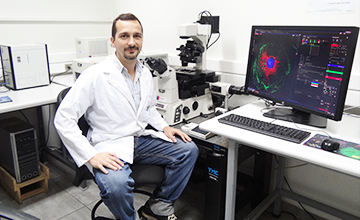
Danilo Medinas, staff scientist at the Instituto de Neurociencia Biomedica in Santiago, Chile, was awarded an MDA Research Grant totaling $240,000 over 3 years to study the potential of targeting ERp57 to treat amyotrophic lateral sclerosis (ALS).
ALS is a deadly motor neuron disease characterized by muscle weakness, paralysis, and premature death. The primary mechanism responsible for the loss of motor neurons remains unknown. The failure of protein quality control in a subcellular “protein factory” called endoplasmic reticulum (ER) has been identified as a common factor driving motor neuron degeneration.
Previous studies from the Medinas lab identified mutant genes in ALS patients that produce dysfunctional mutant proteins in the ER and adversely impact motor neuron connectivity to muscles. Interestingly, the levels of this family of proteins residing in the ER increase in ALS patients carrying mutations in other genes, meaning the mechanisms are similar in distinct ALS cases. Dysfunction of these ER-resident proteins may underlie early pathogenic events of ALS by impairing the communication between motor neurons and muscles.
To investigate this hypothesis, Dr. Medinas and colleagues engineered mice to produce the mutant proteins found in ALS patients for disease modeling. In addition, they will test a gene therapy strategy designed to boost production of functional proteins in the ER and restore motor neuron activity. The research approach aims to uncover common pathological mechanisms of ALS and validate novel therapeutics to recover motor neurons.
https://doi.org/10.55762/pc.gr.81521
Grantee: ALS – Danilo Medinas, PhD
Grant type: Research Grant
Award total:
Institution:
Country:
Grant - Summer 2018 - ALS – Christopher McDermott, MBChB, FRCP, PhD

“There have been conflicting studies with regards to whether diaphragm pacing is a good thing to offer people living with ALS to support their breathing. This study is about making sure patients do not receive an intervention that may potentially do more harm than good.”
Christopher McDermott, professor of Translational Neurology at the University of Sheffield in England, was awarded a research grant totaling $60,000 over 9 months to create a task force to provide unbiased analysis of diaphragm-pacing studies in ALS. This grant is co-funded by MDA, the ALS Association, and the Motor Neuron Disease Association UK.
Weakness of the breathing muscles is a common feature of ALS, causing poor quality of life, breathlessness, recurrent chest infections, and eventually death. The most effective treatment currently for ALS-related breathing issues is a non-invasive ventilator (NIV) that people with ALS use to support their breathing. However NIV can be difficult for individuals to use, and even in those who use NIV, muscle weakness progresses and eventually NIV cannot compensate. There is therefore a need for additional and alternative options for treating breathing problems in ALS. Diaphragmatic pacing (DP) offers such a possibility. A pivotal study in the US demonstrated a survival advantage in people with ALS using DP. The FDA approved DP on humanitarian grounds. The pivotal study compared survival of people with ALS using pacing with historical data rather than having a contemporaneous control group. The results from subsequent UK and French studies demonstrated harm in the groups receiving DP compared to contemporaneous control people with ALS not receiving DP (people with ALS who received DP had shortened survival). The aim of this project is to assemble a task force to oversee an independent analysis of all the available data on DP in people with ALS to understand the differing results and explore if there are potentially people with ALS who may benefit from DP.
Grantee: ALS – Christopher McDermott, MBChB, FRCP, PhD
Grant type: Research Grant
Award total:
Institution:
Country:
Grant - Summer 2018 - Centronuclear myopathies – Jocelyn Laporte, PhD

“I hope people affected by neuromuscular diseases feel that researchers are indeed working hard and in the best ethical manner to provide solutions for a better quality of life, and ultimately to efficiently reverse such diseases.”
Jocelyn Laporte, team leader at the Institut de Genetique et de Biologie Moleculare et Cellulaire (CERBM) in Illkirch, France, was awarded an MDA Research Grant totaling $300,000 over 3 years to study the common pathways altered in centronuclear myopathies (CNMs) as potential therapeutic targets.
CNMs are severe genetic diseases with a strong impact on patient survival and quality of life. The pathological mechanisms are not sufficiently understood and there are no available specific therapies to date.
The identification of molecules (genes, RNA, proteins) that are affected in such diseases will point to key therapeutic targets. Moreover, as Dr. Laporte deciphers to what extent the previous therapeutic proof-of-concepts done in animal models rescue the molecular defects causing the diseases, this work will help to better translate these therapeutic approaches to clinic. In addition, this project could lead to the identification of biomarkers that could be used to follow disease progression and therapy efficacy.
Dr. Laporte and colleagues will use cutting-edge bioinformatic technologies and make the data obtained in this project accessible in an open, integrated knowledge database. This project aims to identify novel therapeutic targets and potential biomarkers that may be common to different forms of CNMs, and sustains or paves the way to future clinical trials.
Grantee: Centronuclear myopathies – Jocelyn Laporte, PhD
Grant type: Research Grant
Award total:
Institution:
Country:
Grant - Summer 2018 - SMA – Rashmi Kothary, PhD
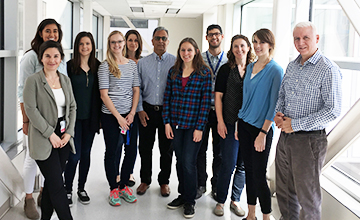
“There has to be great optimism about the emerging therapies for the treatment of SMA. There has been tremendous progress in this area over the past few years. With this progress comes the opportunity to better understand all the ramifications of SMN depletion. What is the new landscape of SMA in the longer-lived patients?”
Rashmi Kothary, senior scientist and deputy scientific director at Ottawa Hospital Research Institute in Ontario, was awarded an MDA Research Grant totaling $300,000 over 3 years to study abnormal fatty acid metabolism that’s a feature of spinal muscular atrophy (SMA). SMA is a an inherited motor neuron disease leading to muscle wasting and difficulties in controlling movement. There has been major progress in identifying the responsible gene, and in generating model systems.
Dr. Kothary’s work has shown that although SMA is largely considered a motor neuron disease, other cell types and tissues have intrinsic problems in the disease context and can contribute to the pathogenesis. Smn depletion leads to major glucose and lipid metabolism defects due to pancreatic and liver abnormalities in a mouse model of SMA.
As new therapies for SMA emerge, these metabolic defects may become more prominent features of the disease as patients are living longer. Additionally, understanding the metabolic abnormalities in SMA patients is important for future drug development, as they may affect drug pharmacokinetics and lead to possible increased risk of liver toxicity. Dr. Kothary and colleagues plan to use their SMA mouse model to get a better understanding of the multi-organ nature of the disorder.
Grantee: SMA – Rashmi Kothary, PhD
Grant type: Research Grant
Award total:
Institution:
Country:
Grant - Summer 2018 - Myopathy and ALS – Dr. Virginia Kimonis, MD, MRCP

“We hope that inhibition of VCP will improve the typical disease pathology in the muscle and spinal cord in the cell and mouse models of VCP-associated myopathy and related disorders, such as ALS, frontotemporal dementia, and other neuro degenerative disorders.”
Dr. Virginia Kimonis, principal investigator in the Division of Genetics & Genome Medicine at the University of California, Irvine School of Medicine Department of Pediatrics, was awarded an MDA Research Grant totaling $200,000 over 2 years to perform preclinical studies for myopathy and ALS with valosin-containing protein (VCP) inhibitor CB5083.
A mutation in the VCP gene is associated with the limb-girdle type of muscle weakness, Paget’s disease of the bone, frontotemporal dementia and amyotrophic lateral sclerosis (ALS). Studies in cell models have shown disease-causing mutations result in a gain of function of the VCP protein, which means that inhibition of the more active VCP protein has therapeutic potential.
Dr. Kimonis and colleagues will test a potent and specific VCP inhibitor, CB-5083, in patient-derived cells and mouse models. CB-5083 is very promising as a therapeutic agent for VCP disease that has been used in a trial of cancer patients by Cleave Biosciences.
Dr. Kimonis has devoted her career to finding a cure for VCP disease and this drug has been the most promising so far. If successful, other disorders such as ALS, sIBM and frontotemporal dementia could be treated using this strategy because of similar mechanisms of disease.
Grantee: Myopathy and ALS – Dr. Virginia Kimonis, MD, MRCP
Grant type: Research Grant
Award total:
Institution:
Country:
Grant - Summer 2018 - DMD – Shama Rajan Iyer, PhD
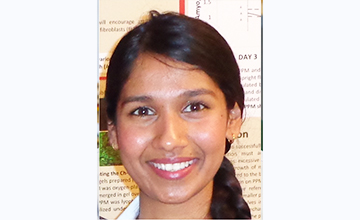
“I began my research in skeletal muscle biology by developing biologic coatings and scaffolds to improve skeletal muscle regeneration following volumetric muscle loss. I was inspired to study the mechanisms that underlie the pathophysiology of DMD,in order to develop potential therapies to improve outcomes for these patients.”
Shama Rajan Iyer, post doctoral fellow at the University of Maryland in Baltimore, was awarded an MDA Development Grant totaling $180,000 over 3 years to study nuclear mechanotransduction in dystrophic muscle.
Duchenne muscular dystrophy (DMD), the most common and severe form of muscular dystrophy, is characterized by progressive wasting of skeletal muscles and premature death. While genetic approaches to replace/repair the dystrophin gene are ideal, recent efforts have shown that secondary/downstream factors play an important role in DMD disease progression and fidelity of gene therapies, and are potential therapeutic targets to help ameliorate the symptoms of DMD. Dr. Iyer’s recent work has shown that the nucleus, which regulates gene expression and is a mechanotransduction hub in muscle fibers, has increased movement in a muscle cells from a mouse model of DMD.
The overall goal of this project is to test whether this nuclear instability contributes to DMD disease progression, which could open new approaches to drug development.
https://doi.org/10.55762/pc.gr.81517
Grantee: DMD – Shama Rajan Iyer, PhD
Grant type: Development Grant
Award total:
Institution:
Country:
Grant - Summer 2018 - Mitochondrial Myopathy – Michio Hirano, MD

Michio Hirano, professor of Neurology at Columbia University Irving Medical Center in New York, New York, was awarded an MDA Research Grant totaling $300,000 over 3 years to support an open-label expanded access trial of deoxynucleoside therapy for TK2 deficiency.
Mitochondrial diseases compose a group of genetic disorders typically affecting multiple organs and are often fatal. Sadly, few treatments are available for these disorders. A subgroup of mitochondrial diseases is mitochondrial DNA depletion syndrome (MDS). MDS encompasses heterogeneous disorders characterized by decreased levels of mitochondrial DNA (mtDNA) in tissues.
MDS is caused by mutations in 21 genes required for maintenance of mtDNA. Thymidine kinase 2 (TK2) deficiency is one of the most frequent forms MDS, with an estimated prevalence of 400 patients in the US. The disease typically affects infants or children and causes muscle weakness (myopathy). The disease course is progressive; more than half of the patients require mechanical ventilation and survival is reduced particularly in infants, who usually die within one year of onset.
Dr. Hirano and colleagues initially demonstrated that deoxynucleoside treatment dramatically extended the lifespan of their Tk2 mouse model of the human disease. They then obtained approval for compassionate use of deoxynucleosides in TK2-deficient patients. Fifteen patients who have received the therapy have shown clinical improvement by diverse measurements across multiple countries. This study will collect uniform prospective clinical information on the safety and efficacy of this treatment in TK2-deficient patients. The results of this study will inform design of the pivotal clinical trial necessary to obtain FDA approval of the therapy.
Grantee: Mitochondrial Myopathy – Michio Hirano, MD
Grant type: Research Grant
Award total:
Institution:
Country:
Grant - Summer 2018 - FSHD – Lawrence James Hayward, MD, PhD

“This condition causes lifelong disability yet is under-recognized by clinicians. What has been amazing to me is the collaborative progress made in recent years to define the underlying genetic abnormality in FSHD. However, there are still large gaps in our understanding of the cellular consequences and the pathological sequence of events leading to muscle damage or impeding muscle repair.”
Lawrence James Hayward, professor of Neurology at the University of Massachusetts Medical School in Worcester, was awarded an MDA Research Grant totaling $300,000 over 3 years to study biomarkers for facioscapulohumeral muscular dystrophy (FSHD) from single-cell expression analyses.
FSHD is the second-most common adult-onset muscular dystrophy and causes lifelong disability for 5 to 12 out of every 100,000 individuals. Recent advances in genetics have identified the genetic cause of FSHD, but key questions remain regarding how muscle damage occurs and whether reliable, non-invasive biomarkers can be identified to monitor disease progression in future clinical trials.
Evidence of early inflammation and altered expression of many genes has been detected in bulk analyses of affected muscles from FSHD patients, but the changes at the individual cell level are poorly understood. Dr. Hayward and colleagues plan to target affected muscles for biopsy using MRI and then examine gene expression patterns in thousands of single cells. They hope to show that FSHD disease progression will be accompanied by changes in muscle stem cells, other cells that live in muscle, and infiltrating immune cells that can be uniquely characterized by these methods. Comparison of cell populations based on single-cell profiling in FSHD biopsies may suggest new targets for therapeutics of FSHD and provide novel biomarkers for future clinical trials.
https://doi.org/10.55762/pc.gr.81542
Grantee: FSHD – Lawrence James Hayward, MD, PhD
Grant type: Research Grant
Award total:
Institution:
Country:
Grant - Summer 2018 - Congenital Myopathy– Dr. Frances Evesson, PhD
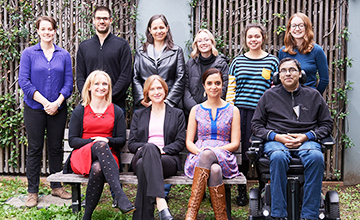
“I am studying the pathology of a newly identified form of congenital myopathy caused by variants in an enzyme called PYROXD1. We know very little about this enzyme, and so my work is trying to understand what it normally does, and how it causes muscle disease in patients. I enjoy the challenge of working on a new biological problem and knowing that our findings have the potential to help people affected by neuromuscular diseases.”
Dr. Frances Evesson, a postdoctoral scientist at the Institute for Neuroscience and Muscle Research at the Children’s Hospital at Westmead in Sydney, Australia, was awarded an MDA Development Grant totaling $180,000 over 3 years to study PYROXD1, a novel cause of congenital myopathy due to accrued oxidative distress.
Dr. Evesson’s work has identified a new gene, PYROXD1, that causes a congenital myopathy. Individuals with variants in PYROXD1 present with typical congenital myopathy symptoms in early childhood: poor muscle tone, respiratory problems, difficulty feeding and swallowing, and later development of distinctive nasal speech.
Dr. Evesson aims to define the function of PYROXD1 and to better understand the physiological effect of loss of PYROXD1 activity in skeletal muscle. PYROXD1 myopathy highlights a new disease pathway in the myopathies, with many similar features to neurodegenerative disorders. Dr. Evesson will use cell- and animal-based assays to probe the role of PYROXD1 in skeletal muscle and extend her studies to a potential role in the brain. These studies have relevance for the understanding of basic biology and also have direct relevance for patients with myopathies, with the ultimate goal of developing effective therapies.
https://doi.org/10.55762/pc.gr.81519
Grantee: Congenital Myopathy– Dr. Frances Evesson, PhD
Grant type: Development Grant
Award total:
Institution:
Country:
Grant - Summer 2018 - LGMD – Dr. Peter Davies, PhD

“Given our past successes with calpains -1 and -2, we are now applying the same structure-guided approaches to study the third calpain family member, calpain-3, and its role in LGMD2A. Our overarching goal has been to use structure-guided approaches to design and develop calpain-specific inhibitors to treat calpainopathies.”
Dr. Peter Davies, Canada Research Chair in Protein Engineering and professor of Biochemistry & Biology at Queen’s University in Kingston, Ontario, was awarded an MDA Research Grant totaling $300,000 over 3 years to study calpain-3 stabilization as a potential treatment for limb girdle muscular dystrophy type 2A (LGMD2A).
LGMD2A is a genetic disease caused by defects in the gene for an enzyme called calpain-3. This enzyme is essential for the correct functioning of muscles and is thought to help recycle muscle proteins that have been damaged during some forms of exercise. If calpain-3 fails to do its job then damaged proteins accumulate and poison the muscles.
More than 500 mutations have been found in the gene for calpain-3 in patients from all over the world. Mutations that produce a deleted or shortened enzyme are easy to explain because the enzyme is then inactive. But about half of the mutations simply change a single amino acid at different places along calpain-3. Without a three-dimensional structure of the enzyme it is difficult to figure out how these changes cause a defect and what, if any, action can be taken to treat the condition.
Dr. Davies and colleagues will determine the structure of calpain-3 by X-ray crystallography. The goal is to have a complete map of the enzyme as well as the enzyme’s binding partners that help regulate its action. Locating the mutations on the map will help explain what caused the enzyme to fail and predict which cases of LGMD2A might be treatable with small molecules to stabilize the enzyme.
https://doi.org/10.55762/pc.gr.81534
Grantee: LGMD – Dr. Peter Davies, PhD
Grant type: Research Grant
Award total:
Institution:
Country:
Grant - Summer 2018 - Pompe and LGMD – Dr. Samya Chakravorty, PhD
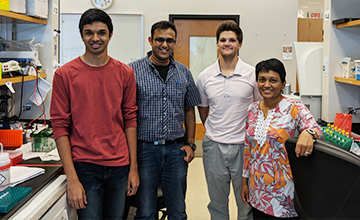
“This work will specify what proportion of LGMD multi-genic cases can reach a molecular diagnosis and get enrolled in clinical trials. Besides the clinical impact, this project will also have a major impact on our basic scientific understanding of how different LGMD subtypes and related diseases such as Pompe disease are related in the muscle genome.”
Dr. Samya Chakravorty, postdoctoral research fellow at Emory University in Atlanta, Georgia, was awarded an MDA Development Grant totaling $180,000 over 3 years to study the functional resolution of multi-genic Pompe and limb-girdle muscular dystrophy (LGMD).
LGMD subtypes are a group of genetic disorders with overlapping phenotypes among themselves and with Pompe disease, complicating accurate disease diagnosis. Genetic testing can aid in this process, but some estimates indicate that even after extensive genetic testing, 30% to 40% of neuromuscular disease patients never receive a complete molecular diagnosis. This is likely due to a combination of new disease genes not identified, as well as a combination of genes that can contribute to disease manifestation. Combinatorial functional assays will confirm this finding and reveal how gene networks may impact disease manifestations, which will improve molecular diagnosis.
Dr. Chakravorty and colleagues plan to use a discovery-driven approach to correlate gene networks with disease phenotype using patient muscle biopsy tissue to test the hypothesis that complex genetic pathways contribute to the Pompe and LGMD mechanism with high prevalence, potentially by synergistic effects of multiple genes.
Grantee: Pompe and LGMD – Dr. Samya Chakravorty, PhD
Grant type: Development Grant
Award total:
Institution:
Country:
MDA Resource Center: We’re Here For You
Our trained specialists are here to provide one-on-one support for every part of your journey. Send a message below or call us at 1-833-ASK-MDA1 (1-833-275-6321). If you live outside the U.S., we may be able to connect you to muscular dystrophy groups in your area, but MDA programs are only available in the U.S.